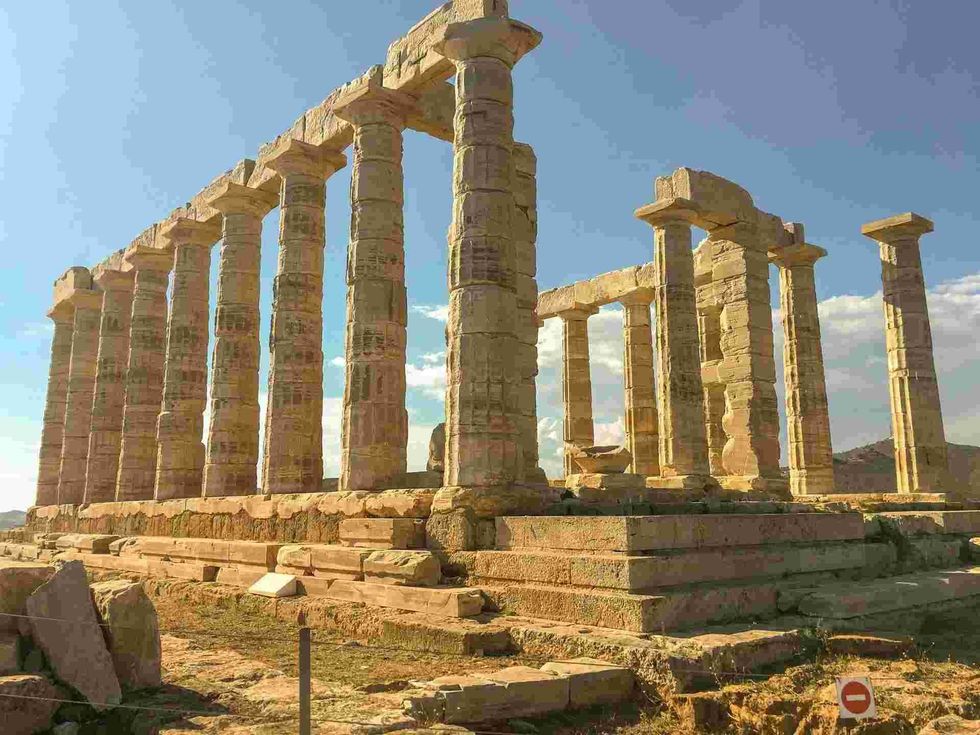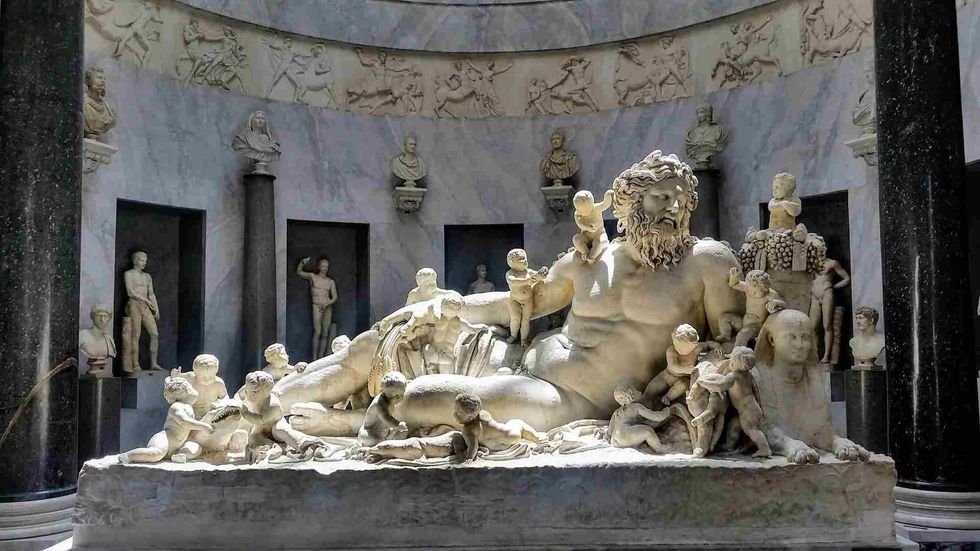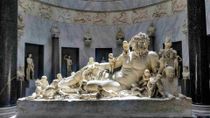Astonishing Ancient Greek Gods And Goddesses Facts That You'll Love
Greek mythology provides us with a different and fascinating range of characters.
There are over hundreds of mythologies in the world that we know of today. There are Greek, Egyptian, Roman, Arabian, Buddhist, Islamic, and many more myths.
Greek mythology is said to be one of the famous mythologies. Greek mythology is a collection of epic stories about Greek gods, goddesses, heroes, animals, and ceremonies. Sea gods, woods gods, sky gods, undersea gods, half-gods, and human heroes all took part in brave or romantic adventures in these mythologies.
If you enjoy reading such interesting and fun facts, check out articles on ancient Greek clothing facts and ancient Greek culture facts.
Worshipping Greek Gods And Goddesses
The principal characters were Greek gods and goddesses who were accompanied by a powerful supporting cast of Greek heroes and heroines and magical, often terrifying monsters. These gods had wars, and these characters experienced terrific adventures.
Greeks of ancient times worshipped many gods and goddesses with distinct personalities and domains. Some people continue to worship gods and goddesses of the past.
This tradition dates back over 2,000 years and has been gaining popularity since the '90s. It is called Hellenism or Hellenic ethnic religion, or Dodekatheism. Other famous Greek myth characters are Achilles, Cassandra, Atlas, Bellerophon, Adonis, Centaurs, and Hades.
Achilles was the son of Peleus in Greek mythology. He was mortal and Myrmidons' monarch, while Thetis was a sea nymph (Nereid). During the Trojan War, he was the best warrior in the army and was noted for his courage and beautiful appearance.
His mother, together with his close pal Patroclus, raised him. Achilles was unstoppable, but for his heel, which gave rise to the term 'Achilles' heel.'
Thetis submerged him in the River Styx while clinging on his heel, which was unharmed by the water. This was one of Achilles' flaws, and as a result, he was eventually killed by Priam's son, Paris. He was the principal figure in Homer's Iliad.
Cassandra was the daughter of the last king (Priam) of Troy. Cassandra was said to be the most beautiful, but she was not a prophetess.
Cassandra was in love with Apollo, and he promised to give her the gift of prophecy if she agreed to his terms. Cassandra, eager to be a prophetess, accepted the arrangement, got the gift of prophecy, but then refused to follow Apollo's wishes. As a form of retaliation, Apollo decreed that no one would ever trust her prophecies.
Hades was the brother of Zeus, Poseidon, Demeter, Hera, and Hestia and the son of Cronus and Rhea. Zeus split Cronus' dominion between him and his brothers after deposing, designating Hades as the god of the underworld.
He married Persephone, Demeter's daughter, whom he kidnapped and made his queen. The two of them governed the underworld together. Hades' job as ruler of the underworld was to oversee the trial and punishment of the wicked, though he did not judge or torture them himself.
In Greek mythology, there are numerous fascinating creatures in addition to people.
Centaurs are a type of creature from Greek mythology. They are half horse and half man. They were the sons and daughters of Ixion, the ruler of the neighboring Lapiths. Centaurs were once supposed to be wild, untamed creatures who were slaves to their animalistic appetites.
In Greek mythology, Adonis was known for his extraordinary beauty. The goddess Aphrodite favored him because of his beauty.
Even when Adonis was a newborn, Aphrodite was enamored with his beauty. Bellerophon and Atlas were also famous characters of Greek myths. Romans worshipped many Greek gods whom they liked or gods whom they discovered among the tribes as they grew.
Importance Of Religion
A demigod or demigoddess is also called a half-god, meaning partly human and partly divine. They date back more than 2,700 years, appearing in written form by Greek poets Homer and Hesiod. Their stories help us to learn about how ancient Greeks lived many years ago.
Another important role that Greek mythology played a part in was explaining how the Earth and people were created and why. Greek myths played an important role for ancient Greeks thousands of years ago.
Ancient Greeks believed gods had complete control over all elements of human existence. They prayed to a god or goddess for protection, believing that they would be punished if these gods were unhappy.
Loyalty, grandeur, wisdom, and hospitality were guiding ideals and values of ancient Greeks. These beliefs may look basic at first glance, but they effectively shaped an entire civilization into one of history's most well-known societies.
Ancient Greek Rituals
There are different rituals in different mythologies. Greek mythology also has its rituals. Greek ancient rituals include animal sacrifices, wine drinking, and libation of wines. Some rituals included covering initiates in plaster and then coating them again after they died so that they would be recognized in the underworld as someone with a ticket to paradise.
To worship their gods and to honor them, Greeks conducted festivals. Each festival would typically begin with a procession to a temple, followed by sacrificing an animal of the same sex as the god being worshipped and then a feast. They held sporting events to worship their gods, such as the ancient Greek Olympics.

Religion, Mythology, And Art
Greek mythology has influenced the literature and arts of western civilization, which was highly affected by Greek culture. Many of the earliest Greek sculptures were painted in vibrant hues and featured non-stone components such as metal and ivory. Pottery painting was regarded as a high art form.
Greek mythology features different characters who were brave and powerful. These stories also have the moral message of emphasizing the difference between right and wrong or strong and weak. It also illustrates lives and traditions of ancient Greeks.
The Greek mythology of having different gods, characters, and stories is shown in architecture in Greek and other parts of the world. Greek mythology has been adapted into modern novels, stories, TV shows, and video games. We now know that the theater word is derived from the Greek word, theatron, which refers to an outdoor seating section.
Famous Greek Gods And Goddesses
Greek gods and goddesses had the qualities of humans. But it is said that they also had more powers than mortals, for example, the power to live forever.
There were 12 most important Greek gods and goddesses who lived on Mount Olympus who were worshipped by Polytheistic ancient Greeks. On this mountain, they held discussions and resolved arguments, and hence they were called ‘The Olympians’.
The Olympians came to power when they had a victory in the massive war between Zeus and the Titans, which lasted for 10 years. There were numerous Olympians who resided on Mount Olympus.
Of all the gods, Zeus (whose Roman name is Jupiter), the ruler of Mount Olympus, the King of the gods, was believed to be powerful. Zeus was mighty and the reason for the 10-year war between Olympians and Titans.
Zeus, being a ruler, was the god of the sky, justice, order, and law and the god of lightning and thunder. Zeus was the brother of Poseidon, Hades, Demeter, and Hestia, and for Hera, he is both brother and husband.
He was also the youngest child of Cronus, the Titans' first commander; and Rhea, the daughter of Gaia, the goddess of the Earth. As a result of the fight, Zeus triumphed over his parents. It is said that Zeus came to know that his second child would be more powerful than him, and hence he ate his wife.
After the demise of Metis, when Hephaestus cleaved Zeus's head, Athena, the goddess of war, emerged, fully grown and armed. Zeus's father Cronus had intentions to eat him alive at birth.
He is considered to be the youngest and eldest of his siblings. He let the Olympians win against the Titans.
He is similar to sky gods in other ancient religions. He had many wives, lovers, and children.
The Greek goddess Hera (whose Roman name is Juno) was the queen of the Olympian gods and the goddess. Juno was the goddess of family, women, childbirth, and marriage.
She was the wife of Zeus and also the daughter of Cronus. Hera was very angry with Zeus, as he had many affairs throughout their marriage, both with other goddesses and with mortals. Hera would frequently attempt to get vengeance on her husband's lovers and also their children.
In ancient Greece, Poseidon (whose Roman name is Neptune) was the God of hurricanes, water, storms, seas, horses, and quakes. He was the brother of Hades and Zeus and the son of Cronus.
Initially, the sea of gods was said to be decided between Poseidon and Hades, his brother. These brothers were highly competitive and desperate to win. This sea God features in stories about the Trojan war in which he bore a grudge against the King Laomedon of Troy.
In ancient Greece, Demeter (whose Roman name was Ceres) was the goddess of agriculture, harvest, fertility, nature, and the seasons. Demeter governed and watched over grains and the Earth's fertility, as her name suggests.
Cronus and Rhea had a daughter named Demeter. She was Zeus and Poseidon's lover as well as their sister. In the list of Olympian Gods, you will also find Athena.
This Greek goddess was the goddess of warfare, handicraft, and wisdom. She was considered the patron and protector of many cities in Greece, especially in Athens, which is thought to be where she gained her name. Athena's symbols include the olive tree and the owl.
Like many other Greek myth characters, she is said to have a strange birth. She was born from Zeus's forehead, dressed in armor, and fully grown.
In ancient Greece, another Greek god is Apollo. He was the god of medicine, poetry, the sun, arts, archery, manly beauty, music, healing, light, and truth.
He used to hunt with a silver bow and was also called the god of music and healing. Apollo was the son of Zeus and the twin brother of Artemis, and the most handsome of all the Greek gods.
Another Greek goddess was Artemis, the daughter of Zeus and the twin sister of Apollo. This twin sister was the goddess of the plague, the Moon, the wilderness, protection, virginity, archery, childbirth, and hunting. She used silver arrows for hunting and adored all wild animals.
Among all the Olympian gods, Ares was one of them and the son of Zeus and Hera. He was the god of war and violence. He was known for his rage and ferocity, and all of the gods, except for Aphrodite, detested him.
In Greek mythology, another famous character is Aphrodite. Aphrodite was the goddess of fertility, procreation, love, beauty, pleasure, passion, and desire. She supported and fought for Paris during the Trojan War.
Hephaestus was a master craftsman and blacksmith and the god of the fire, forge, invention, craftsmanship, and volcanoes in ancient Greece. He did many useful things for gods and goddesses. He made the first mortal woman in the world, named Pandora, from clay.
He also made winged sandals for Hermes, messenger of gods. It is disputed whether he was born from Zeus, but his mother was Hera. Hephaestus was married to Aphrodite.
The Greek God, Hermes, was the god of travel and messenger of gods. His symbols include the caduceus, winged sandals, and a winged hat, and he used to carry a magic wand. He was also held responsible for guiding dead souls. He was the son of Zeus and Maia and one of the youngest Greek Olympians.
These are some famous gods and goddesses of Greek mythology. In addition to these gods, we need to consider two more gods or goddesses: Hestia and Dionysus.
This Greek goddess, Hestia, was the goddess of fire, hearth, and ordering right to domesticity and family. Hestia was also the child of Cronus and the older sister of Zeus, Hades, Demeter, Poseidon, and Hera.
The Greek God, Dionysus, was the god of wine, the grapevine, fertility, madness, and resurrection. He was also a supporter of performing arts.
Parents of Dionysus were Zeus and Semele, who was a mortal Theban princess. Dionysus (whose Roman name was Bacchus) was the youngest Olympian god and the only one born of a mortal mother. Ariadne, who was a Cretan princess, was the wife of Dionysus.
The Greek god Poseidon was married to Amphitrite, who was a Nereid and queen of the sea. In Greek mythology, Nereids are female spirits of the sea.
Here at Kidadl, we have carefully created lots of interesting family-friendly facts for everyone to enjoy! If you liked our suggestions for ancient Greek gods and goddesses facts, then take a look at ancient Greek democracy facts or ancient Greek architecture facts.
We Want Your Photos!
More for You
Bachelor of Science specializing in Botany, Master of Science specializing in Clinical Research and Regulatory Affairs

Sridevi ToletyBachelor of Science specializing in Botany, Master of Science specializing in Clinical Research and Regulatory Affairs
With a Master's degree in clinical research from Manipal University and a PG Diploma in journalism from Bharatiya Vidya Bhavan, Sridevi has cultivated her passion for writing across various domains. She has authored a wide range of articles, blogs, travelogues, creative content, and short stories that have been published in leading magazines, newspapers, and websites. Sridevi is fluent in four languages and enjoys spending her spare time with loved ones. Her hobbies include reading, traveling, cooking, painting, and listening to music.
Bachelor of Arts specializing in English

Shruti ThapaBachelor of Arts specializing in English
With a passion for American, British, and children's literature, Shruti is currently pursuing a Bachelor's degree at Garden City University, Bengaluru. Her fluency in Nepali, Hindi, and Mandarin demonstrates her linguistic abilities and global perspective. In addition to her literary pursuits, she has a keen interest in non-fiction literature, aesthetics, early childhood education, and Egyptian history. Shruti's research paper 'Bringing Art Illustrations In Education And Pop Culture' showcases her proficiency in these areas and her dedication to academic excellence.
Disclaimer
1) Kidadl is independent and to make our service free to you the reader we are supported by advertising. We hope you love our recommendations for products and services! What we suggest is selected independently by the Kidadl team. If you purchase using the Buy Now button we may earn a small commission. This does not influence our choices. Prices are correct and items are available at the time the article was published but we cannot guarantee that on the time of reading. Please note that Kidadl is a participant in the Amazon Services LLC Associates Program, an affiliate advertising program designed to provide a means for sites to earn advertising fees by advertising and linking to Amazon. We also link to other websites, but are not responsible for their content.
2) At Kidadl, we strive to recommend the very best activities and events. We will always aim to give you accurate information at the date of publication - however, information does change, so it’s important you do your own research, double-check and make the decision that is right for your family. We recognise that not all activities and ideas are appropriate for all children and families or in all circumstances. Our recommended activities are based on age but these are a guide. We recommend that these ideas are used as inspiration, that ideas are undertaken with appropriate adult supervision, and that each adult uses their own discretion and knowledge of their children to consider the safety and suitability. Kidadl cannot accept liability for the execution of these ideas, and parental supervision is advised at all times, as safety is paramount. Anyone using the information provided by Kidadl does so at their own risk and we can not accept liability if things go wrong.
3) Because we are an educational resource, we have quotes and facts about a range of historical and modern figures. We do not endorse the actions of or rhetoric of all the people included in these collections, but we think they are important for growing minds to learn about under the guidance of parents or guardians.







